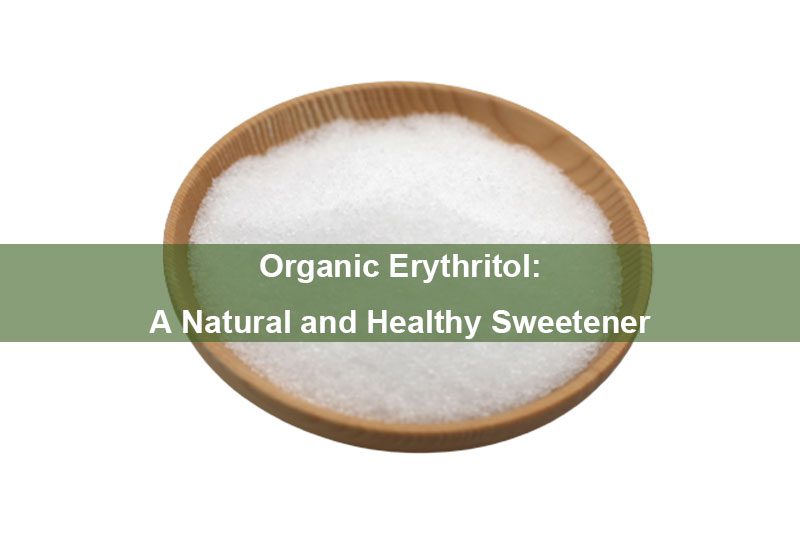Table of Contents
Organic allulose, a naturally occurring sugar found in small quantities in foods like figs, raisins, and maple syrup, has gained significant attention as a low-calorie sweetener. Commercially, it is produced from organic sources such as corn and is available in different forms, including organic allulose sweetener and organic allulose syrup. This article explores the benefits and uses of organic allulose in detail, highlighting its nutritional profile, impact on blood sugar levels, health benefits, and potential risks.

Nutritional Profile of Organic Allulose
Organic allulose is a monosaccharide that is structurally similar to fructose but with distinct metabolic properties. It offers several nutritional advantages:
- Caloric Content: Organic allulose contains approximately 0.4 calories per gram, which is significantly lower than the 4 calories per gram found in regular sugar. This makes it an excellent low-calorie alternative.
- Sweetness: It is about 70% as sweet as sucrose (table sugar), allowing users to achieve a comparable level of sweetness with less quantity.
- Carbohydrate Content: Despite its sweetness, organic allulose has minimal impact on blood sugar levels and is not metabolized into glucose, making it an appealing option for diabetics.
- Absorption: Around 70% of allulose is absorbed in the digestive tract and excreted through urine, with minimal contribution to caloric intake.
Forms of Organic Allulose
- Organic Allulose Sweetener: This is available in powdered or granulated form and can be used as a direct substitute for sugar in various recipes.
- Organic Allulose Syrup: A liquid form of allulose, used as a sweetener in beverages, sauces, and syrups. It offers the same benefits as the powdered form but with the added convenience of easy mixing and dispensing.
Health Benefits of Organic Allulose

Organic allulose provides several health benefits, making it an attractive choice for health-conscious consumers:
- Promotes Weight Loss: Due to its low-calorie content, organic allulose can help reduce overall calorie intake, potentially aiding in weight management and loss.
- Blood Sugar Management: Organic allulose does not significantly affect blood sugar levels, making it suitable for people with diabetes or those monitoring their blood sugar.
- Dental Health: Unlike regular sugar, allulose does not contribute to tooth decay, thus promoting better oral health.
- Fat Loss: Research indicates that allulose may enhance fat oxidation and reduce body fat percentage, contributing to overall health improvements.
- Anti-Inflammatory Properties: Emerging studies suggest that allulose may help reduce inflammation, which is beneficial for preventing chronic diseases.
Uses of Organic Allulose
Organic allulose’s versatility allows it to be used in various applications:
- Baking: Organic allulose sweetener can replace sugar in baking, providing sweetness without the added calories, making it ideal for low-calorie desserts.
- Beverages: Both the sweetener and syrup forms can be used to sweeten drinks, such as coffee, tea, smoothies, and sodas, without affecting blood sugar levels.
- Dairy Products: Organic allulose syrup is commonly used in sweetened yogurts, ice creams, and other dairy products to lower the calorie content while maintaining a desirable taste and texture.
- Snack Foods: Allulose is included in granola bars, snack foods, and other processed products as a healthier alternative to traditional sweeteners.
- Dietary Supplements: It is used in dietary supplements and meal replacement shakes for those looking to reduce their sugar intake while maintaining sweetness.
- Keto-Friendly Products: Organic allulose is popular in keto-friendly products due to its low carbohydrate content, making it suitable for sugar-free and low-carb diets.
Impact on Blood Sugar Levels

One of the most significant benefits of organic allulose is its negligible impact on blood sugar levels. This makes it particularly beneficial for individuals with diabetes or those looking to manage their blood sugar:
- Low Glycemic Index: Organic allulose has a very low glycemic index, which means it does not cause significant spikes in blood glucose levels. This property makes it an excellent sugar substitute for diabetics and those on low-GI diets.
- Post-Meal Blood Sugar: Consuming organic allulose does not lead to substantial increases in post-meal blood sugar levels, making it safe for inclusion in various meals and snacks.
- Insulin Response: Studies indicate that allulose does not trigger a significant insulin response, making it a safer alternative for those with insulin sensitivity.
Potential Risks and Side Effects
While organic allulose is generally recognized as safe, it is important to be aware of potential risks and side effects:
- Digestive Issues: Consuming large amounts of allulose may lead to digestive discomfort, including bloating, gas, and diarrhea. This is because allulose is not fully absorbed in the digestive tract.
- Allergic Reactions: Rarely, some individuals may experience allergic reactions to the source materials used in allulose production, such as corn.
- Moderation: As with any sweetener, it is important to consume organic allulose in moderation to avoid overconsumption and potential digestive issues.
Conclusion
Organic allulose, available as both a sweetener and syrup, offers a range of health benefits, including weight loss promotion, blood sugar stabilization, and improved dental health. Its versatility in various food products makes it an attractive alternative to regular sugar. However, it is crucial to consume it in moderation and be mindful of individual tolerance levels.
As consumer interest in low-calorie and natural sweeteners continues to grow, organic allulose is poised to become a popular choice for those seeking a healthier lifestyle. By integrating organic allulose into their diets, consumers can enjoy the sweetness they crave without the negative health impacts associated with traditional sugars.

